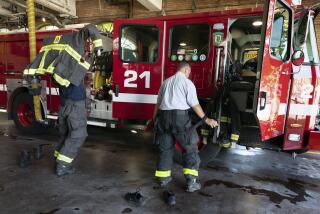Barbecue Lighter Fluid Comes Clean : Environment: Kingsford had said it couldn’t be done. But its products pass new strict smog standards.
- Share via
In court, at public hearings and in letter-writing campaigns, they said it couldn’t be done. But Kingsford Products Co. has saved the tradition of lighter fluid-induced flames for the barbecue chefs of smoggy Southern California. And some of the firm’s competitors hope to follow suit.
Kingsford has invented low-polluting versions of its lighter fluid and pre-soaked briquettes that pass the new strict emission standards of the South Coast Air Quality Management District, the agency announced Tuesday. The standards, which take effect in 1992, limit volatile organic compounds to 0.02 of a pound per start. A third Kingsford product, bag-light charcoal, complied with the rule without a change in formula.
Now, 23 other products are scheduled for analysis. Like the Kingsford merchandise, each will have a 25-minute turn in the AQMD’s test grill, in a shed in the parking lot at the district’s El Monte headquarters. “There are a number of companies with products that look very promising,” said Bill Welch, an air quality engineer involved in the review.
So much for the barbecue industry’s dire predictions that the air quality district would wipe out the cookout. “This happens often,” said AQMD spokeswoman Paula Levy. “We adopt a regulation, industries say they can’t comply, and then they find a way.”
The AQMD board approved standards for barbecue equipment last October, after studies showed that grilling with lighter fluid was responsible for about two tons of pollutants daily in Los Angeles, Orange, Riverside and San Bernardino counties. That is roughly equivalent to a medium-size oil refinery’s output.
Retailers caught selling dirty barbecue products after next Jan. 1 risk a $25,000 fine.
The Barbecue Industry Assn. tried unsuccessfully to head off the regulation with a mail and telephone lobbying effort and later with a Los Angeles Superior Court lawsuit.
Kingsford was one of the regulation’s most vocal critics. Pat Meehan, the firm’s environment and safety director, griped last year that “industry finds its products effectively banned with really no chance to reformulate.”
At the time, Kingsford’s technicians already had been working on new formulas for about two years, according to spokeswoman Sandy Sullivan.
Uncertain of success, Kingsford started marketing charcoal chimneys--in essence, large cans equipped with a handle and a rack to hold briquettes, ignited by burning newspapers stuffed underneath.
The chimneys, which became a yuppie fad between Memorial Day and the Fourth of July, are cleaner than the newly certified products and Kingsford will continue to sell them.
The chimney emits 0.007 of a pound of pollutants per start. Other clean barbecue methods are propane and electric probes, which both emit 0.008 of a pound per start, Levy said.
The new fluid, which is 40% cleaner than conventional fluid, emits 0.02 of a pound per start; the bag, 0.014 of a pound, and quick-lighting charcoal, 0.013 of a pound.
All three will soon appear in the region’s stores in packages emblazoned with the proclamation: “Approved for use in the L.A. area.”
More to Read
Inside the business of entertainment
The Wide Shot brings you news, analysis and insights on everything from streaming wars to production — and what it all means for the future.
You may occasionally receive promotional content from the Los Angeles Times.










